
Question: Are there social media/mental health curriculum we can use with teens in the school setting? Lesson plans? Group counseling manuals? Thank you!
Answer: We know that the average tween and young teenager spends multiple hours a day using screens. How they use screens, including social media, matters. There is a lot of variety in how kids tie their social and emotional development to social media use. For example, being included in online social groups can help teens feel like they belong to a community and help support their identity, while being excluded can leave teens feeling lonely and lacking in self-confidence.
Despite the amount of time adolescents spend using digital media, adults should not assume that all students understand how to navigate it. The classroom setting offers many opportunities to help bridge this gap, by offering lessons surrounding digital citizenship, “netiquette” and media literacy. There are several free, evidence-based curriculums designed for middle and high schoolers that can support educators in teaching about digital literacy in a school setting:
- Common Sense Media's Digital Citizenship curriculum provides lesson plans on media balance & wellbeing, privacy & security, digital footprint & identity, relationships & communication, cyberbullying, digital drama, hate speech and news & media literacy.
- Educators can delve deeper into the Digital Citizenship curriculum by participating in a one-hour training that is offered by Common Sense Media.
- Media Power Youth’s Screenshots curriculum includes lesson plans, podcasts, a project, and an interactive notebook.
- The curriculum focuses on thinking critically about social media messages, managing online conflict, exploring how digital media relates to substance use, and practicing empathy when navigating online challenges.
- Teens & Tech provides a curriculum for educators on how adolescent brain development affects technology use and well-being.
- Ed Tech Triangle’s model guides teachers and admins on spreading wellness and sharing resources about digital wellness in the classroom.
Using Phones and Social Media as Teaching Tools
There is some evidence that with intentional instructional design, handheld devices including smartphones can enhance learning by using strategies like inquiry-oriented learning and computer-assisted testing. For example, when students use smartphones to conduct research on a topic and or when teachers use smartphones for formative assessment during a lesson to get immediate feedback on what students do and don’t understand. Here are some resources that offer ideas for using phones and social media as teaching tools:
- Social Media for Civic Education by Amy L. Chapman
- “Smartphone Apps in Education: Students Create Videos to Teach Smartphone Use as Tool for Learning”
- “Twenty Ideas for Using Mobile Phones in the Language Classroom”
Mental Health Education
Here are some valuable resources to integrate mental health education for teens:
- Mental Health & High School Curriculum Guide: Understanding Mental Health and Mental Illness Version 3: An evidence-based resource designed for grades 9 and 10, focusing on mental health literacy, including optimizing mental health, understanding mental disorders, reducing stigma, and enhancing help-seeking skills.
- Active Minds Peer-Powered Mental Health Curriculum for High Schools: Empowers students to discuss mental health, available for classrooms and high school chapters.
- Child Mind Institute Mental Health Skill-Building Curriculum: A workshop series for teaching evidence-based coping skills, adaptable for grades K-12.
- Stigma Free Society’s Social Media and Our Mental Health: Targets grades 8-12, exploring how to develop positive relationships with social media and its impact on mental health through visual art activities.
- Adolescent Pregnancy Prevention Program’s Being Tech Smart: Engages youth in discussions about digital technology use and its impact on mental and emotional health.
- We Think Twice Mental Health and Social Media Quiz: A free quiz that helps teens understand how their social media habits might affect them, with evidence-based feedback on various topics.
- SchoolSafety.gov Mental Health Resources: A clearinghouse of resources for various school safety topics, including mental health and trauma-informed practices.
- AAP Center of Excellence on Social Media and Youth Mental Health Family Tip Sheet: Provides research-based tips for families to help children develop healthy digital habits.
- Mental Health America’s Selfies, Social, and Screens Toolkit: Offers information and resources for protecting youth mental health in a digital world, including practical tips for managing social media use.
By using these resources, teachers and counselors can help students understand and manage how social media affects their mental health.
Age: 14-18
Topics: Social media, mental health curriculum, school, social media mental health curriculum, Digital citizenship curriculum for teens, school lesson plans on social media, school-based prevention and intervention
Role: Clinician

Submit a New Question
Have additional questions after reading this response? Or have any other questions about social media and youth mental health? Submit your own question to be answered by our expert team. Your answer will then be added to our Q&A Portal library to help others with similar questions.
Last Updated
08/28/2024
Source
American Academy of Pediatrics
